Overview
Introduction to Puppy Vaccine Schedule

Welcome to our Comprehensive Guide to Puppy Vaccine Schedule. Bringing a new puppy into your home is an exciting time, but it also comes with important responsibilities, such as ensuring your furry friend stays healthy and protected.
One of the most crucial steps in caring for your puppy is providing proper vaccinations. In this guide, we’ll cover everything you need to know about puppy vaccinations, including the importance of a puppy vaccination schedule, common vaccines, and the recommended puppy shots.
By following this guide, you can help keep your puppy happy, healthy, and protected from preventable diseases.
Importance of Puppy Vaccination
Puppy vaccinations are crucial for protecting your furry friend from serious diseases like canine distemper. Following a puppy vaccination schedule helps ensure that your puppy receives the necessary shots at the right times.
Vaccinations not only protect your puppy but also contribute to the overall health of the canine community by preventing the spread of diseases from infected dogs to healthy dogs. By vaccinating your puppy, you’re giving them the best chance at a healthy life, as the vaccine protects against these illnesses.
In rare cases, vaccinated dogs may still contract the disease, but the severity of the illness is typically reduced. It’s important to stick to the recommended puppy vaccine schedule to provide your puppy with the best protection against these diseases.
Understanding Puppy Immune System
Understanding a puppy’s immune system is crucial for their health. Unlike adult dogs, puppies have developing immune systems that are not fully functional until around 16 weeks of age. During the first few weeks of life, puppies rely on antibodies from their mother’s milk to protect them.
As puppies grow, their immune system gradually becomes stronger, helping them fight off infections and diseases. This developmental process is critical for the overall health and well-being of the dog’s immune system.
When planning a puppy vaccine schedule, it’s important to consider their immune system development and provide vaccinations at appropriate times to ensure their immunity against diseases.
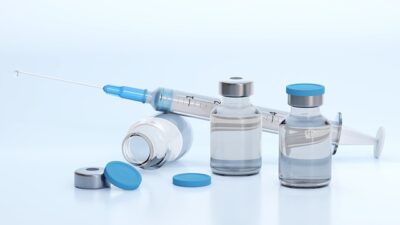
Core Vaccines for Puppies
Distemper
Core vaccines for puppies typically include protection against distemper, adenovirus, and parvovirus. Canine distemper is a highly contagious viral disease that can be fatal, especially in puppies.
Puppies should receive their first distemper vaccination at around 6 to 8 weeks of age, followed by additional shots every 3 to 4 weeks until they are about 16 weeks old. It’s important to keep puppies away from potentially infected animals until they are fully vaccinated.
This helps prevent the spread of the virus and protects the health of the puppy. Following a vaccination schedule for puppy shots is crucial to ensure their immunity is developed properly.
Parvovirus
Core vaccines for puppies include protection against canine parvovirus or parvo, a highly contagious virus that can be life-threatening, especially in young puppies.
Puppies should receive their first parvovirus vaccination at around 6 to 8 weeks of age, with additional shots given every 3 to 4 weeks until they are about 16 weeks old. Vaccination is crucial in preventing parvovirus infection and ensuring the health of puppies. Early vaccination against parvo is key to protecting puppies from this deadly disease.
Adenovirus 1 and 2
Core vaccines for puppies include protection against adenovirus type 1 and 2, which are highly contagious viruses that can cause respiratory and liver infections. Adenovirus type 1 is also known as infectious canine hepatitis.
Puppies should receive their first adenovirus vaccination as part of their regular vaccination schedule, typically starting at around 6 to 8 weeks of age. Vaccination helps protect puppies from these serious diseases and is an important part of their overall health care.
Rabies
Core vaccines for puppies include protection against rabies, a deadly viral disease that can be transmitted to humans. The rabies vaccine is typically administered as part of a regular vaccination schedule, starting at around 12 to 16 weeks of age.
Along with other core vaccines like distemper and adenovirus, rabies vaccination helps protect puppies from serious diseases and ensures they live a long and healthy life. It’s important to keep puppies away from already infected dogs and wildlife to prevent the spread of rabies.
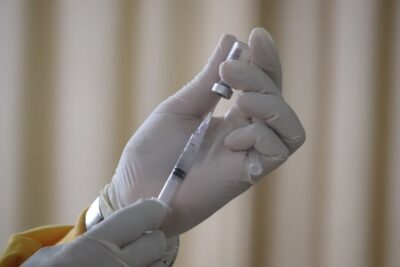
Non-Core Vaccines for Puppies
Bordetella (Kennel Cough)
Non-core vaccines for puppies include protection against Bordetella bronchiseptica, which causes kennel cough, a highly contagious respiratory disease.
While not always included in the standard puppy vaccination schedule, Bordetella vaccination is recommended for puppies who are frequently exposed to other dogs, such as those in boarding facilities or dog parks.
Symptoms of kennel cough include a persistent cough, nasal discharge, and occasionally, mild fever or abdominal pain. Vaccinating against Bordetella can help prevent puppies from contracting kennel cough from infected animals, reducing the risk of secondary infections like ear infections.
Parainfluenza
Non-core vaccines for puppies include protection against canine parainfluenza, a respiratory virus that can cause coughing and other respiratory symptoms. While not usually life-threatening, canine parainfluenza can lead to secondary infections and should be considered, especially in environments where dogs are frequently in close contact.
Vaccination against canine parainfluenza is recommended for puppies in high-risk environments, such as boarding facilities or dog shows, where they may come into contact with infected animals. Pregnant dogs should also be vaccinated to protect the health of the puppies. Limiting an infected animal’s access to other dogs can help prevent the spread of canine parainfluenza.
Leptospirosis
Non-core vaccines for puppies include protection against leptospirosis, a bacterial disease that can affect dogs and other animals. Dogs contract Lepto through contact with infected urine, which can occur from other animals or contaminated water sources, including drinking water contaminated with the Leptospira bacteria.
It’s important to vaccinate puppies against leptospirosis to prevent them from contracting the disease and potentially spreading it to other animals or humans. Left untreated, leptospirosis can lead to serious health issues. Vaccination can help avoid contracting Lepto and protect puppies from strains like leptospira pomona.
Canine Influenza
Non-core vaccines, like the one for Canine Influenza, are crucial for protecting puppies against specific diseases that may not be prevalent in all areas. Canine Influenza, unlike Parainfluenza, is a highly contagious respiratory infection that can be severe, especially in puppies and adult dogs.
These shots help prevent your pet from contracting the virus from an infected animal, ensuring a long and healthy life for your furry friend. Regular vaccination is essential to maintain your pet’s condition and overall well-being.
Lyme Disease
Non-core vaccines, such as those for Lyme Disease, are important for protecting puppies against specific diseases. Accurate diagnosis and timely shots are crucial in preventing the spread of Lyme Disease, which is transmitted through tick bites.
These vaccines also help protect against other diseases like hepatitis, ensuring your puppy’s health and well-being. Regular vaccination is essential for maintaining your pet’s overall health.
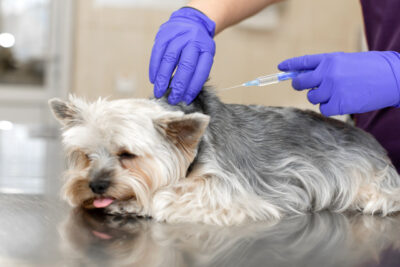
Ideal Puppy Vaccination Schedule
Age-Specific Vaccination Timeline
The ideal puppy vaccination schedule follows an age-specific timeline to ensure proper immunity development.
Starting at around 6-8 weeks, puppies should receive their first shots, including core vaccines like canine distemper, parvovirus, and adenovirus-2. Boosters are then administered every 2-4 weeks until around 16 weeks of age to provide full protection.
Frequency of Vaccinations
The ideal puppy vaccination schedule involves multiple visits to the veterinarian for vaccinations. These visits typically occur every 3-4 weeks starting at around 6-8 weeks of age and continue until the puppy is around 16 weeks old.
Your veterinarian will provide specific advice on the number of visits and vaccines needed to ensure your puppy is protected against common diseases.
Initial Vaccination Series
The ideal puppy vaccination schedule begins with an initial series of puppy vaccinations starting at around 6-8 weeks of age. This series typically includes core vaccines such as distemper, adenovirus-2, and parvovirus, given in multiple doses 3-4 weeks apart.
Completing this initial series is crucial to providing the puppy with immunity against these serious diseases.
Booster Shots
After the initial vaccination series, booster shots are administered to puppies to maintain their immunity against diseases. These booster shots are typically given annually or as recommended by the veterinarian, depending on the specific vaccine and the puppy’s risk factors.
Ensuring timely booster shots is essential for providing long-term protection and overall health for the puppy.

Factors Influencing Vaccination Schedule
Breed
The breed of a puppy can influence its vaccination schedule due to varying susceptibility to certain diseases, such as kennel cough.
Some breeds may be more prone to certain illnesses, leading to adjustments in the vaccination timeline or additional vaccines, like the rabies vaccination, being recommended.
It’s essential for breed-specific factors to be considered when determining the best puppy vaccination schedule. By tailoring the vaccination schedule to the specific needs of the breed, veterinarians can help ensure that puppies receive the necessary protection against diseases while minimizing the risk of over-vaccination.
Environment
The environment in which a puppy lives can significantly influence its vaccination schedule. Puppies exposed to high-risk environments, such as areas with a high prevalence of certain diseases or frequent contact with other animals, may require more frequent or additional vaccinations. Factors such as climate, local wildlife, and exposure to other pets can all impact the vaccination needs of a puppy.
It’s important for veterinarians to consider these environmental factors when developing a puppy vaccine schedule. By assessing the risk factors in a puppy’s environment, veterinarians can ensure that puppies receive the appropriate vaccinations to protect their health and well-being.
Health History
A puppy’s health history is a crucial factor in determining its vaccination schedule. Puppies with underlying health conditions or a history of certain diseases may require a modified vaccination schedule to ensure their safety and efficacy.
It’s important for veterinarians to consider a puppy’s health history when developing a vaccination plan to provide optimal protection against preventable diseases.
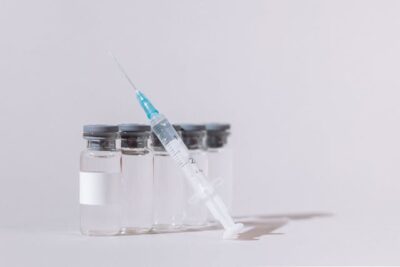
Vaccine Administration and Safety
Proper Vaccine Administration
Proper vaccine administration is essential for puppy vaccination to be effective and safe. Vaccines should be administered by a trained professional, following the specific guidelines for puppy shots.
This includes selecting the right vaccine, using proper injection techniques, and recording the vaccination details accurately.
Following the recommended puppy vaccine schedule ensures that your puppy receives the necessary vaccinations at the right times, maximizing their protection against diseases.
Common Side Effects
Common side effects of puppy vaccination can include mild fever, lethargy, and soreness at the injection site. These side effects are usually mild and short-lived, resolving on their own within a day or two.
However, if more severe side effects occur, such as difficulty breathing or swelling of the face, immediate veterinary attention should be sought.
Vaccine Safety Concerns
Vaccine safety concerns for puppy vaccinations include the rare risk of allergic reactions and vaccine-associated adverse events. While these occurrences are uncommon, it’s essential to monitor puppies closely after vaccination and report any unusual symptoms to a veterinarian.
Overall, the benefits of vaccination in preventing serious diseases far outweigh the risks of these rare events. When following your puppy vaccine schedule, it’s important to stay vigilant and communicate any concerns with your veterinarian to ensure your puppy’s safety and well-being.
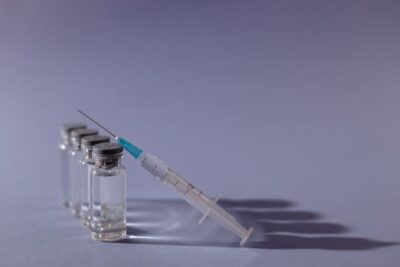
Importance of Veterinarian Consultation
Customized Vaccination Plan
A veterinarian consultation is crucial for creating a customized puppy vaccination plan, particularly for diseases like canine distemper and canine parvovirus.
These plans take into account factors such as the puppy’s breed, age, health status, and lifestyle to ensure they receive the appropriate vaccines at the right times.
Consulting with a veterinarian helps ensure that puppies are protected against these serious diseases while minimizing the risk of over-vaccination. When planning your puppy vaccine schedule, a veterinarian’s expertise ensures your puppy receives the necessary vaccines tailored to their specific needs.
Regular Check-Ups
Regular check-ups with a veterinarian are crucial for ensuring a puppy’s long and healthy life, even after they become an adult dog. These check-ups allow the veterinarian to assess the puppy’s overall health, discuss any concerns, and adjust the vaccination schedule as needed to provide ongoing protection against diseases.
Consulting with a veterinarian throughout the puppy’s life helps maintain their health and well-being into adulthood. When it comes to your puppy vaccine schedule, your vet can provide guidance and ensure your furry friend is protected at every stage of their life.
Summary of Puppy Vaccine Schedule
Recap of Core and Non-Core Vaccines
Core vaccines are essential for all puppies, providing protection against common and potentially deadly diseases. These include distemper, adenovirus, parvovirus, and rabies. Non-core vaccines, such as those for bordetella and leptospirosis, are recommended based on the puppy vaccine schedule and the puppy’s lifestyle and risk of exposure.
Recommended Vaccination Timeline
- 6-8 weeks: Start initial vaccination series with core vaccines (distemper, adenovirus, parvovirus, rabies).
- 10-12 weeks: Administer second round of core vaccines.
- 14-16 weeks: Complete core vaccine series and administer rabies vaccine.
- 12-16 weeks: Consider non-core vaccines, such as bordetella and leptospirosis, based on risk factors.
- Annual boosters: Keep vaccinations up to date to ensure continued protection into adulthood.
Conclusion: Puppy Vaccine Schedule
Proper vaccination is crucial for the health and well-being of your puppy. Following a recommended puppy vaccine schedule, including core and non-core vaccines, helps protect your furry friend from serious diseases and contributes to the overall health of the canine community.
Consulting with your veterinarian and maintaining regular check-ups throughout your puppy’s life ensures they receive the necessary vaccines and care to live a long and healthy life. Remember, vaccination is a key part of responsible pet ownership and helps keep your puppy happy and protected.
We offer puppies for sale in Florida and surrounding areas that are thoughtfully bred from reputable breeders. Our pups are healthy, friendly, and cared for as family. We guarantee that your new family member will be exactly what you expect.
Our commitment is to provide quality puppies for sale in Florida, ensuring they are well-loved and ready to become cherished members of your family.
Frequently Asked Questions (FAQs): Puppy Vaccine Schedule
- What vaccinations does my puppy need?
- Your puppy will need core vaccinations for diseases like distemper, hepatitis, parvovirus, and rabies. Non-core vaccines, such as those for bordetella and leptospirosis, may be recommended based on your pet’s lifestyle and risk factors.
- At what age should my puppy start vaccinations?
- Puppies should start their vaccinations at around 6-8 weeks of age, with additional doses given every 3-4 weeks until they are about 16 weeks old.
- How often does my puppy need to be vaccinated?
- After the initial series, your puppy will need booster shots annually or as recommended by your veterinarian to maintain immunity.
- Can I vaccinate my puppy at home?
- It’s important to have your puppy vaccinated by a veterinarian. They can ensure the vaccines are administered correctly and provide advice on the best vaccination schedule for your pet.
- Are there any side effects of puppy vaccinations?
- Most puppies experience no side effects, but some may have mild reactions like soreness at the injection site or mild fever. Serious side effects are rare but should be reported to your vet immediately.
- Do puppy vaccinations constitute medical advice?
- No, the information provided here is for educational purposes only. Always consult with your veterinarian for personalized medical advice for your pet.
- Can my puppy get sick from the vaccines?
- Vaccines are designed to stimulate your puppy’s immune system without causing the disease. However, it’s possible for vaccinated puppies to still contract the disease, but the severity is typically reduced.
- Is it necessary to vaccinate my puppy against leptospirosis?
- Leptospirosis is a bacterial disease that can affect both dogs and humans. Your vet may recommend vaccinating your puppy against leptospirosis, especially if they are at risk of exposure to contaminated water sources.
- What is bordetella, and why is it included in some vaccination schedules?
- Bordetella bronchiseptica is a bacterium that causes kennel cough, a highly contagious respiratory disease in dogs. Vaccinating against bordetella is recommended for puppies who are frequently exposed to other dogs, such as those in boarding facilities or dog parks.
- Can my vaccinated puppy still carry lepto or parvo and infect other dogs?
- While vaccination significantly reduces the risk, it’s still possible for a vaccinated puppy to carry and shed the bacteria or virus, potentially infecting other dogs. Regular vaccination and good hygiene practices can help minimize this risk.




